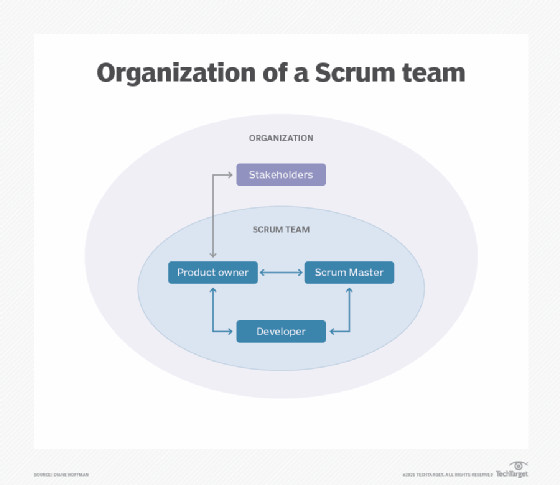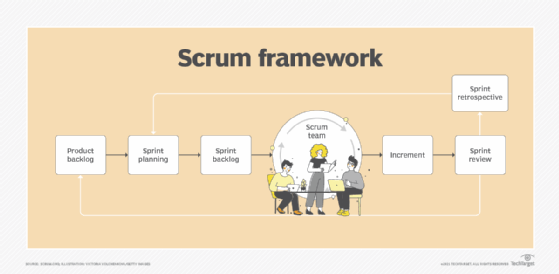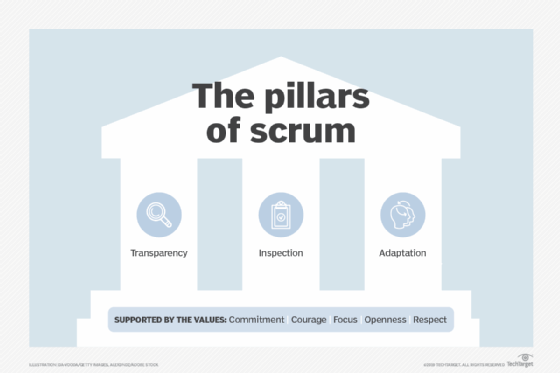Scrum master
What is a Scrum master?
A Scrum master is a facilitator for an Agile development team. They are responsible for managing the exchange of information between team members. Scrum is a project management framework that enables a team to communicate and self-organize to make changes quickly, in accordance with Agile principles.
Although the scrum analogy was first applied to manufacturing in a paper by Hirotaka Takeuchi and Ikujiro Nonaka, the approach is often used in Agile software development and other types of Agile project management. The term comes from the sport rugby, where opposing teams huddle together during a scrum to restart the game. In product development, team members huddle together each morning for a daily stand-up meeting where they review progress and essentially restart the project.
What does a Scrum master do?
A Scrum master leads a scrum. Scrums are daily meetings conducted by Agile, self-organizing and cross-functional teams that enable the team to convene, share progress and plan for the work ahead. Some teams have a fixed Scrum master, while others alternate the role with various team members occupying the position on different days. No one approach is right, and teams can choose to appoint the Scrum master role as best fits their needs.
During the daily meetings, the Scrum master asks the team members three questions:
- What did you do yesterday?
- What will you do today?
- Are there any impediments in your way?
The Scrum master then uses the answers to those questions to inform tactical changes to the team's process, if necessary.
Roles, responsibilities of a Scrum master
Although the title of Scrum master sounds powerful, this position is not the project leader and is not held accountable for project outcomes; this responsibility is given to the team as a whole. Although the official Scrum Guide no longer refers to the Scrum master as a servant leader as it once did, their purpose does serve the team through the Scrum process, creating a framework in which every team member can do their best work to meet a common goal.
An ideal Agile team has the team -- not one individual -- manage its process. However, the Scrum master position evolved to take responsibility, while keeping the process as team-oriented as possible.

The Scrum master is a highly dynamic role and is responsible for the following:
- Helping the team to reach a consensus for what can be achieved during a specific period of time -- referred to as a sprint.
- Helping the team to reach consensus during the daily scrum.
- Helping the team stay focused and follow the agreed-upon rules for daily scrums.
- Removing obstacles that are impeding teamwork and the team's progress.
- Protecting the team from outside distractions.
- Ensuring product backlog items are clearly defined and managed efficiently.
- Identifying areas that need improvement and establishing actions to address them in future sprints.
- Conducting one on ones with team members and stakeholders to improve team development, resolve process-related roadblocks and increase collaboration.
- Removing external obstacles and internal barriers through process or workflow enhancements.
- Being willing to jump in and do anything that makes the team comfortable -- this could include doing extra chores, such as fixing PCs, helping with building maintenance or making food arrangements for the team.
Skills required of a Scrum master
The Scrum master's main role is that of a facilitator. They ensure that best practices are followed and that the team's projects progress. A scrum that follows best practices should encourage transparency, inspection and adaptation.
Common skills required of a Scrum master include the following:
- The ability to facilitate communication between team members and to promote a sense of community.
- The ability to help team members adapt to new situations through Agile coaching and training.
- The ability to communicate the team's progress and needs to external teams.
- The soft skills and empathy to handle changing interpersonal dynamics, behavioral patterns and conflict resolution.
- The ability to stay organized to help with successfully managing multiple tasks, meetings and projects.
- The technical skills pertinent to Agile management and software development.
- Leadership qualities for understanding the needs of the team and keeping them on track with their project goals.
In addition to the Scrum master, other Scrum roles include the project manager and product owner, which are different but equally significant responsibilities on the team. These roles work together with the Scrum master to achieve a well-defined common goal.
Who needs a Scrum master?
Teams that follow an Agile methodology and aim for a team-centric process with a bottom-up management style benefit from the Scrum master role. In development, teams of this kind often exist at the beginning of the technology value stream. This is because the nature of development work often requires a high degree of flexibility and collaboration.
Objectives may change from day to day, and timelines may contract or expand depending on external requirements. The Scrum master implements enough structure to keep the team's development effort focused, while ensuring the team remains adaptable, as changes to the plan are inevitable and even welcome.
Some teams may find that a Scrum master is not necessary if every team member understands Scrum methodology and can manage their workflow in harmony with other team members. The ideal scrum has no master and gives each team member an equal role in managing workflow. However, many teams find that having a designated Scrum master is helpful to streamline the Agile process. Scrum masters are also sometimes hired as consultants.

Benefits of employing a Scrum master
Employing a Scrum master can bring several benefits to an organization.
Some benefits of employing a Scrum master are the following:
- Designated team leader. Scrums have a designated leader specialized for the Scrum master job.
- Enhanced collaboration and communication. A Scrum master fosters effective communication and collaboration within the Scrum team and with stakeholders. They also facilitate creating a positive environment, where team members can openly share information, ideas and concerns.
- Increased adaptability. Teams with Scrum masters adopt Agile methodologies and a culture of failure to increase their overall adaptability. A culture of failure views failures as opportunities instead of setbacks.
- Adoption of Agile methodologies. Scrum masters increase the ability of the entire organization to adopt Agile methodologies and to transition from traditional Waterfall methodologies.
- Improved morale of the team. The Scrum master acts as a leader who is dedicated to meeting individual needs and promoting the happiness of the team.
- Accelerated market entry. Through the application of Agile Scrum principles and practices, a Scrum master enables the team to expedite the delivery of products or projects. Scrum's iterative and incremental approach facilitates continuous feedback and adaptation, enabling teams to rapidly adjust to shifts in customer preferences and market dynamics.
- Improved software quality. A Scrum master promotes Agile engineering practices, such as code reviews, automated testing and continuous integration. These processes aid in the creation of high-quality software by identifying and resolving issues early in the development cycle.
- Reduced risks. The Scrum master helps identify and mitigate risks by continuously monitoring and adjusting the product and process, enabling the team to proactively address issues and lessen their impact.
- Increased agility. A Scrum master helps a company transition from Waterfall processes to Agile and adaptable methods, such as Scrum, which promotes increased productivity, creativity and customer happiness.
Some organizations choose to hire Scrum masters as consultants instead of designating an in-house employee. The added benefit of hiring an external Scrum master is that they do not have preexisting biases about the organization and can bring fresh ideas.

Scrum master vs. product owner
Scrum masters and product owners are alike in that they both are responsible for managing and optimizing the product backlog. They both predict the necessary work to deliver a successful product.
However, they differ in their approach to this goal in the following ways:
- The product owner approaches work with a top-down approach to delivering a successful product by planning far ahead and developing a course of action for the team to follow.
- The focus of a product owner is on the bigger strategy. The Scrum master is less concerned with a long-term strategy and is more concerned with noticing immediate issues and reacting to them as they crop up.
- The focus of a Scrum master is on employing tactics to fine-tune the team's process as time goes on.
- The product owner has the authority to decide on the product backlog and the ranking of user stories. Product owners collaborate closely with the development team and ensure that the product aligns with customer requirements.
- The Scrum master doesn't hold direct authority over the team but serves as a leader, directing and mentoring the team to accomplish their objectives.
Scrum master vs. project manager
Scrum masters and project managers have the same objective: to help their teams get work done efficiently. They differ in their approach to this goal in the following ways:
- Project managers have a more traditional management role. They focus on progress reports, milestones and strict project timelines, for example.
- Project managers are goal-oriented and focus on controlling the team from the top down to achieve the goal.
- Scrum masters are process-oriented. Instead of setting a collection of goals and restrictions for a team to ensure it stays on track, the Scrum master focuses on streamlining and optimizing the processes that help teams meet their goals.
- Scrum masters take a bottom-up approach to management and view themselves as a team member instead of a team manager.
Certifications for Scrum masters
Scrum masters can obtain several certifications to demonstrate their proficiency with Scrum project management principles.
The Scrum Alliance offers the most recognized 16-hour certification course that enables individuals to become Certified ScrumMasters (CSMs). The certification process includes explanations of the Scrum framework, as well as the various team roles, events and artifacts incorporated into Agile development.
Many other Scrum master certifications exist. A few examples are the following:
- Registered Scrum Master certification through Scrum Inc.
- Professional Scrum Master I (PSM I) certification through Scrum.org.
- Advanced CSM (A-CSM) through the Scrum Alliance.
- Agile Certified Practitioner (PMI-ACP) from the Project Management Institute.
- Disciplined Agile Scrum Master (DASM) certification offered by PMI.
- SAFe Scrum Master (SSM) from Scaled Agile.

To land a dream job as a Scrum master, it's important to ace the interview. Explore these Scrum master interview questions and answers to help you succeed.